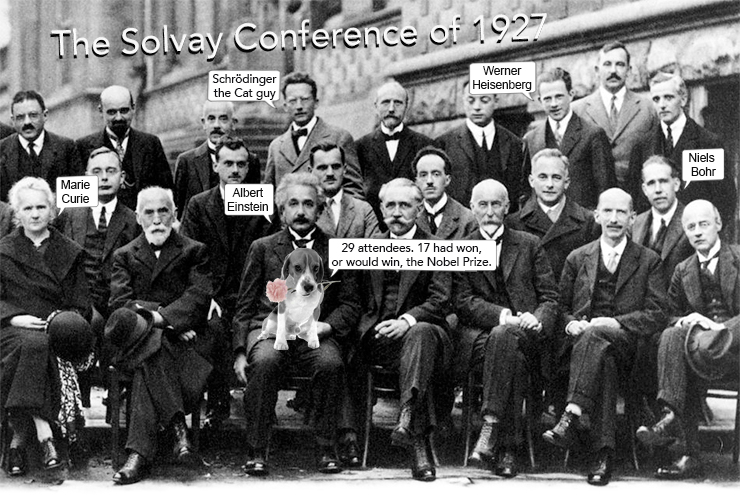Each of us creates our own reality from our interpretations of the things we observe. A systematic pattern of interpretations is called a cognitive bias.
This is how a cognitive bias works: If you believe that elves cause rain, then every occurrence of rain is proof of elves.
Cognitive biases can be miniscule or massive. Wikipedia has 192 of the most common of them organized alphabetically in their List of Cognitive Biases. Here are a few of my favorites:
Third-Person Effect – Belief that mass communicated media messages have a greater effect on others than on themselves.
Cheerleader Effect – The tendency for people to appear more attractive in a group than in isolation.
Halo Effect – The tendency for a person’s positive or negative traits to “spill over” from one personality area to another in our perceptions of them. This is similar to the Physical Attractiveness Stereotype, in which we assume that people who are physically attractive also possess other socially desirable qualities.
And then, of course, there are some tragic cognitive biases, such as:
Compassion Fade – The predisposition to behave more compassionately towards a small number of identifiable victims than to a large number of anonymous ones.
Naïve Realism – The belief that we see reality as it really is – objectively and without bias; that the facts are plain for all to see; that rational people will agree with us; and that those who don’t are either uninformed, lazy, irrational, or biased.
But there is one pair of cognitive biases that isn’t on Wikipedia’s list, and these biases run so deep in us that they form our beliefs about the nature of reality and how the universe works.
This pair of cognitive biases would more accurately be called a duality, since the closer you move toward one of them, the further you move away from the other.
Let’s call them
- “Cause-and-Effect”
- “You Can’t Know for Certain Until You Get There.”
“Cause-and-Effect” assumes that we live in an organized universe which can be predicted with certainty if only we have enough data. “Cause-and-Effect” is the world of Newtonian Physics and cooking with a recipe. “Plan your work and work your plan.”
The opposing belief is that we can calculate probabilities, but “You Can’t Know for Certain Until You Get There.” This is the world of improvisation, Plan B, and the ability to cook something wonderful from whatever you happen to find in the pantry. “Work with what you’ve got.”
Physicists have been trying to reconcile these belief systems since 1927 when General Relativity and Quantum Mechanics were discovered to be mutually exclusive, although both can be proven unconditionally.
Einstein, the champion of “Cause and Effect” said to Niels Bohr, “I, at any rate, am convinced that God does not throw dice.”
To which Niels Bohr, the champion of “You Can’t Know for Certain Until You Get There,” replied, “Quit telling God what to do with his dice.”
Physicist Stephen Hawking would later add, “Not only does God play dice, but he sometimes throws them where they cannot be seen.”
Your internal, unconscious belief system dictates whether you will
A: create a recipe, a step-by-step plan, and then seek to acquire the elements to actualize that plan, or
B: acquire whatever is available to you and then figure out how to organize it for maximum effect.
Both systems have proven to be profoundly effective.
Never try to convince a practitioner of the opposite system that their way of thinking is stupid, foolish, or self-limiting.
They probably have a long list of accomplishments that will prove you wrong.
Roy H. Williams
 HEADS UP – Today’s rabbit hole isn’t extensive, but it is very deep and densely packed. “Deep” as in big ideas, complex, a reframing of our understanding. You people brought me some fairly weighty things this week! We also have some gorgeous aerial photos. Aroo. – Indy Beagle
HEADS UP – Today’s rabbit hole isn’t extensive, but it is very deep and densely packed. “Deep” as in big ideas, complex, a reframing of our understanding. You people brought me some fairly weighty things this week! We also have some gorgeous aerial photos. Aroo. – Indy Beagle
 Starting out 2 years ago with only $1,000, Michael Craig is brewing up some impressive profits as the owner of Creature Coffee. His mission is to let the world know that some of the greatest coffee bean alchemists in the world reside in Texas, where he opened his retail, mail order, and event-catering business featuring special Texas-roasted coffee beans. You can smell the seductive aroma of his stories as he regales roving reporter Rotbart over a cup of espresso at MondayMorningRadio.com
Starting out 2 years ago with only $1,000, Michael Craig is brewing up some impressive profits as the owner of Creature Coffee. His mission is to let the world know that some of the greatest coffee bean alchemists in the world reside in Texas, where he opened his retail, mail order, and event-catering business featuring special Texas-roasted coffee beans. You can smell the seductive aroma of his stories as he regales roving reporter Rotbart over a cup of espresso at MondayMorningRadio.com
